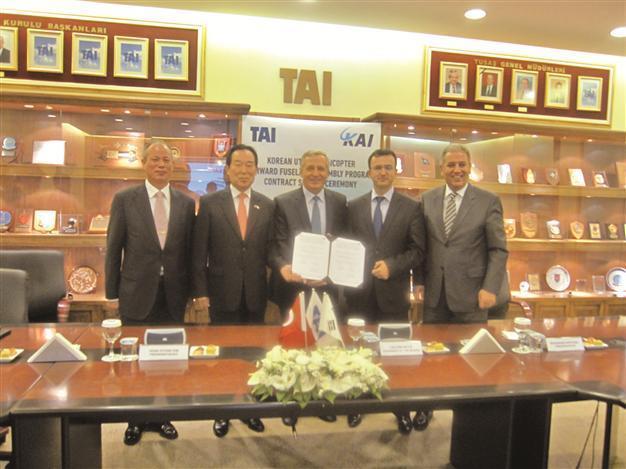TAI inks pact with Korean counterpart
ANKARA - Hürriyet Daily News

Turkish and South Korean aerospace firms Turkish Aerospace Industries (TAI) and Korean Aerospace Industries (KAI) have signed a cooperation pact under which TAI will produce the front fuselages of 110 KAI Surion utility helicopters.
The deal was signed in Ankara yesterday during a visit to TAI headquarters by Hong-kyung Kim, the president and CEO of KAI, as the two firms completed the construction of 40 basic trainers, the KT-1T.
The Turkish Air Force is presently checking the last three aircrafts in the series, but they are expected to be officially delivered as early as next week, officials said. KAI is due to continue with logistical support of the planes.
KAI is building a total of 240 KAI Surion utility helicopters for the Korean Army, and TAI will build the front fuselages of 110 of the aircraft, worth over $30 million, Kim told the Hürriyet Daily News.
The Undersecretariat for Defense Industries, Turkey’s defense procurement agency, and KAI signed a $350 million contract in 2007 for 40 KT-1Ts for the Air Force.
Five of the initial aircraft were built at the KAI plant in South Korea and the remainder were jointly manufactured at a TAI plant. The KT-1T is a turboprop aircraft.
Separately, TAI is working on the Hürkuş, Turkey’s first Turkish-designed trainer aircraft.
The KT-1T is the Turkish version of KAI’s KT-1 Woongbi, developed for South Korea, but it includes modifications required by the Turkish Air Force. KAI won the contract against several rivals, including U.S. company Raytheon and Brazil’s Embraer. The KT-1Ts will replace the aging U.S.-made T-37 trainer planes.
Close ties between Turkey and South Korea date back to the Korean War of the early 1950s, when a Turkish contingent of up to 15,000 soldiers, under the United Nations flag, fought against North Korean and Chinese troops.
Despite the traditionally strong political ties, the two countries only began to develop close economic and trade relations in the past 10 years.
 Turkish and South Korean aerospace firms Turkish Aerospace Industries (TAI) and Korean Aerospace Industries (KAI) have signed a cooperation pact under which TAI will produce the front fuselages of 110 KAI Surion utility helicopters.
Turkish and South Korean aerospace firms Turkish Aerospace Industries (TAI) and Korean Aerospace Industries (KAI) have signed a cooperation pact under which TAI will produce the front fuselages of 110 KAI Surion utility helicopters.